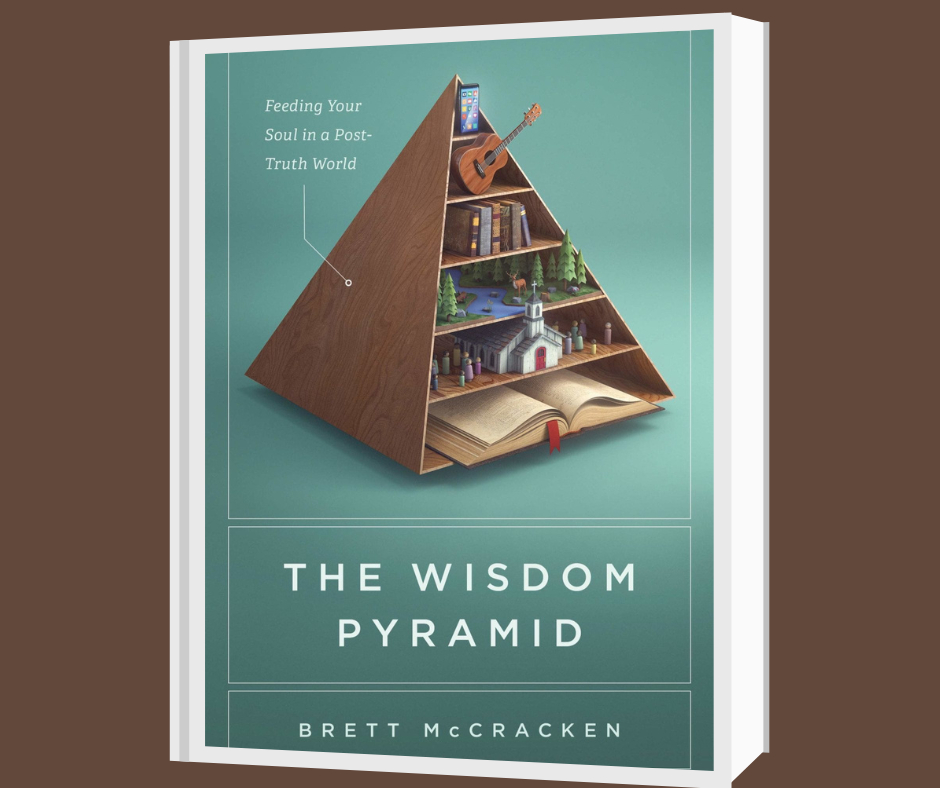Book Reviews
The Wisdom Pyramid: Feeding Your Soul in a Post-Truth World, by Brett McCracken | Review by Rosa Byler

Comparing the intake of knowledge to eating food is no new idea. Moses draws parallels between daily manna and God’s words; Proverbs’ wisdom invites the simple to a banquet; newborn Christians thrive on milk while the more mature enjoy meat. Brett McCracken furthers this analogy with the food pyramid, a design familiar to moderns concerned about healthy eating. With the Bible as the broad base of the pyramid and a smartphone in the tiny top section, the book’s cover is nearly enough to convey the message. Yet the other wisdom sources are worthy of ongoing discussion, and The Wisdom Pyramid primes the pump well.
Three unwise habits of knowledge intake are introduced and then expanded upon in subsequent chapters: eating too much (information overload), eating too fast (no time for critical thinking), and eating only what one likes (increasingly customized media). Technology users may experience some sort of mental/emotional “Ding!” on reading these.
Symptoms of information intemperance include anxiety, stress, disorientation, fragmentation, and confirmation bias. Speedy access to information fosters skim-reading, which weakens our ability to process and meditate and increases susceptibility to fake news. Surface grazing on data encourages the development of alternate versions of truth (consider the heady sensation of expertise that can develop after we read several blogs that we agree with). Fast-spreading yet unproven opinions on vaccines, politics, essential oils, and COVID, to name a few, prompt the spurning of authoritative voices and trusting what is right in our own eyes.
The larger portion of the book addresses sources of wisdom. Scripture comes first, the foundation as well as the framework through which we must evaluate all other sources. However, McCracken says it is easy to merely “use” parts of scripture we like in an attempt to fit the Bible around our pattern of life instead of shaping our lives around the Word. All of scripture is authoritative and must be read as a whole narrative; it should prompt worship and obedience but does not have to “make complete sense” to us. Mysteries will remain.
The church (second source) “can be an indispensable source of stability and growth, a treasure-trove of…wisdom that we would be foolish to neglect.” (88) Why should people be running to the church instead of leaving? As an interpretive and historical community, the church militates against individualism. Its God-centered rhythms remind us weekly that life is not about us. It provides accountability and limitation in family-style ways, providing tangible connectedness to a group we didn’t choose and moral clarity we may not always like. With resources thousands of years old and realities that will exist forever, the church is a powerful antidote to the insecurities of a present-focused world.
Nature, the third-level source of wisdom, is God’s general revelation. It evidences His creative genius and reminds us that we are creatures, not the Creator. Even secular pundits agree that urban life and excessive digital stimuli can change the way our brains work, fostering anxiety and depression, and nature has restorative possibilities. Nature also demonstrates that harm can result from genetic modification of plants, although many who recognize this have no objection to chemical and surgical “modification” of human gender.
Two cultured wisdom sources are good books and the mystery of beauty. Books can educate us, connect us with other people, and arouse questions; yet one of reading’s main benefits is to make us think. Beauty, while more difficult to define, has always been part of worship. Music and art shape our hearts, affections, and minds in addition to the overt truths they express. Beauty in creation is obvious; McCracken says some forms of Christian upbringing may hamper our ability to see sabbath and the Lord’s Supper as opportunities for acquiring wisdom through beauty. His explanation is excellent.
With measured access, the internet and social media can definitely be sources of wisdom. McCracken labels complete avoidance a luxury that few can afford. Rather than withdrawing from technology, Christians should model responsible practices. Its benefits include access (to theological resources, Bible translations, sermons…), platform (for discussions, debates, and trying out ideas), and consensus (the potential for review, exposure, and accountability). The book closes with a summary, “What Wisdom Looks Like.”
The original food pyramid has been the subject of much contention and revision as food production continues to develop and change. Taking a thoughtful look at our wisdom source “pyramids” is a good idea as well. This book is an accessible primer to further reflection on the subject, challenging and thorough yet easily read. Questions at the end of each chapter can be used for personal reflection or small-group study, and McCracken frequently gives short lists of helpful-habit-shaping tips.